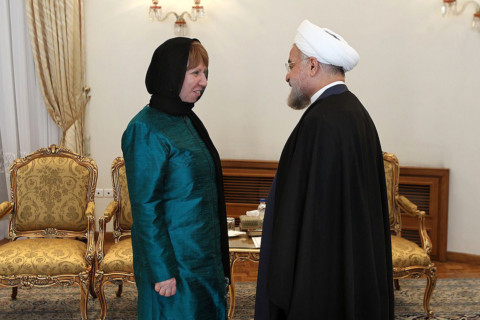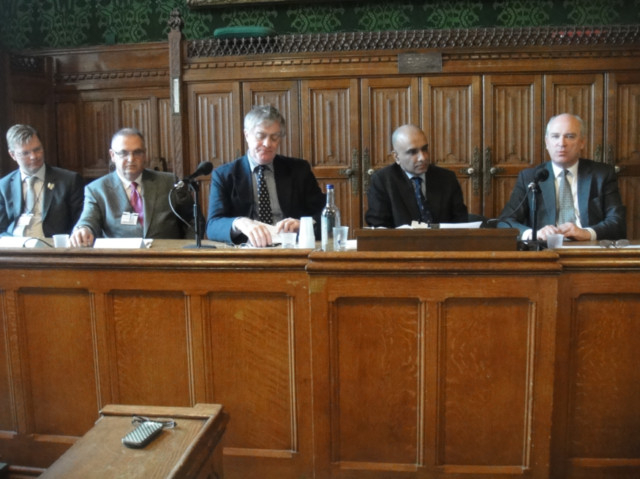
Iran’s relations with the international community were discussed at a recent (27/2) conference in London organised by the South Asia and Middle East Forum (SAMEF). Held in a committee room in the House of Commons, Westminster, and chaired by SAMEF founder Khalid Nadeem, the focus was largely on the nature of Iran’s nuclear programme.
Speaking from the American standpoint was Dr Jack Caravelli, who served for 25 years in the United States government. As a member of the White House National Security Council Staff, he was director for non-proliferation, focusing on Russia and the Middle East.
He also served as deputy assistant secretary of energy, director of the Office of International Material Protection and Cooperation and as a senior adviser to the secretary of energy. Under Caravelli’s leadership, the Material Protection, Control and Accounting (MPC&A) programme was responsible for securing nuclear weapons and material at 95 facilities in the former Soviet Union, including securing approximately 4,000 nuclear warheads at 42 Russian Navy storage sites.
With reference to the talks in Vienna between representatives of Iran and the so-called P5+1, namely the US, Britain, France, China and Russia plus Germany, Caravelli said they presented a serious opportunity for the nuclear issues to be resolved. He described the negotiations as a first step — following the interim agreement reached last November in Geneva between Iran and the P5+1 in which Iran agreed to curb uranium enrichment above 5 per cent and give UN inspectors better access in return for about $7 billion (Dh26 billion) in sanctions relief.
He cautioned that for the talks to be “robust” and “credible” they would need to be “much more than what has been agreed so far by Iran and the P5+1”. In his view, “there are still great concerns about elements of the Iranian programme that are not addressed in the interim agreement. That certainly includes activities that took place at a facility called Parchin, where almost certainly Iran conducted conventional high-explosive testing related to the development of a nuclear warhead.”
Parchin Military Complex (PMC) is a sprawling installation run by Iran’s Ministry of Defence and Armed Forces Logistics (MODAFL). PMC lies about 32 kilometres southeast of Tehran in and around the small town of Parchin, in Tehran province’s Pakdasht county.
Caravelli added: “The production of seven or eight tonnes of low-enriched uranium is wholly unrelated to anything Iran is doing; low-enriched uranium is used, as you know, in connection with commercial nuclear power plants — about 5 per cent enrichment level. Iran has only one nuclear power plant and this year Russia is providing the fuel for it. So, Iran has no requirement legitimately for that kind of material.”
He also expressed concerns about the Arak heavy water production facility. “Why heavy water?” he asked, adding: “It should be converted to light water again from the proliferation experts’ point of view.”
Caravelli said better relations with Iran were achievable but he saw difficulties ahead. “It is problematic in my judgment that Iran will have the wherewithal to shutter key elements of its programme if that is what it takes to reach a final deal. Nations traditionally vote with their resources. Iran has voted through thick and thin in its economy to invest heavily in these nuclear programmes.”
On an optimistic note, he concluded: “Sometimes international politics does have a moment of light and we will see if that carries through and opens a new door. President Rouhani’s outreach, for whatever reason, has changed the dynamic of the US-Iranian relationship. There is an open-mindedness, as I see it, in the White House and the State Department to see how far this carries through.”
The picture, he indicated, would become clearer over the next three to four months as the scheduled talks progress. “We will have to see where all this goes. We will watch carefully and try to keep our friends in Israel calm,” he said.
With respect to Israel, he said that it was well known that the influence of the Jewish lobby on the US congress was very strong. In fact, he said, it was a joke in Washington that Israeli Prime Minister Benjamin Netanyahu has “better relations with the Congress than Barack Obama”. He added that it was “premature” to think that President Obama will re-establish diplomatic relations with Iran. “Not yet — for domestic political reasons,” he said.
Ivan Volodin, a counsellor at the Russian Embassy, London, said that it was important to deal with the nuclear issues per se and not to try to load the talks with other agendas. “The point we have been consistently making with our international partners is that efforts on the nuclear programme should be just that — they should address the concerns of the international community but they should not lead to any long-term discrimination against Iran, let alone attempts at influencing its domestic affairs,” he said. “We fully support a mechanism of control over Iran’s nuclear activities but we reject those measures aimed at stifling the Iranian economy, provoking internal dissent and isolating Iran internationally.”
He cautioned that “an isolated and humiliated Iran wouldn’t be a safe and predictable partner for its neighbours. The crucial element of our approach to Iran is that Iran should be allowed enriched uranium for peaceful purposes — of course under strict control. This would be a truly fair and non-discriminatory solution.”
On the detail of the ongoing talks, he said: “I must say, when I read the internal reports about centrifuges, heavy water, light water, yellow cake, with all the figures and technical terms, I see that people mean business and that negotiations are being conducted thoroughly and with good scientific advice. That gives reasons to hope that an agreement will be reached that will provide efficient guarantees of the peaceful nature of the nuclear programme, but without undue limitations in the field of civilian nuclear energy and without humiliating conditions for Iran.”
Patrick Mercer, a British MP, who served as infantry officer in the British Army and is a former shadow minister for homeland security, said that many in Iran regarded the United Kingdom as ‘Perfidious Albion’. He noted that there is a boulevard in Tehran named after the IRA hunger striker Bobby Sands — evidence of empathy for a man who became emblematic of the struggle to achieve a united Ireland and force the British out of Northern Ireland.
In his view there is a “thaw” in the UK’s relations with Iran but it is early days.
Sir Nick Harvey, a British Liberal Democrat politician who served as Minister of State for the Armed forces from 2010-2012, said, “It is time to bring Iran in from the cold”. He noted that mistrust between Iran and the West had been festering for many decades. He pointed to the betrayal that many Iranians feel concerning the involvement of the US in the 1953 coup which ousted Iran’s democratically elected Prime Minister, Mohammad Mossadeq.
He said that George Bush’s branding of Iran in his 2002 State of the Union address as part of “an axis of evil, arming to threaten the peace of the world” had done “incalculable damage” to its international relations. He observed that the constructive role that Iran had been playing in Afghanistan was derailed by this designation.
In the aftermath of the 9/11 attacks relations between the United States and Iran seemed to be warming up, as Iran quietly offered support for the US campaign in Afghanistan. In November 2001 secretary of state Colin Powell shook hands with the Iranian foreign minister, Kamal Kharrazi, at the UN headquarters in New York City, a gesture that seemed to indicate a rapprochement between the US and Iran after the schisms caused by the Islamic revolution and the hostage crisis in 1979.
Harvey said that the “reinstatement of talks is in our interest even if they hit snags from time to time”. Referring to the young population of Iran, he said, “we must avoid driving them into the arms of the ultra-nationalists in Iran”. He concluded, “We must play a long game — if things do sour we must continue to respect them, their history and their civilisation.”
Some members of the audience raised Iran’s human rights record as a reason for treading cautiously in engaging with the country. They cited the imprisonment, torture and execution of thousands of political prisoners, the murder of political opponents and the violations against religious minorities. Harvey agreed that “Iran’s human rights record is appalling”, and added, “It was a tragic mistake of history that Kurdistan was denied nationhood.”
However, he said it would be counterproductive to insist on commitments on human rights as preconditions to dialogue: “In order to deal with the race and Kurdish issues, normalising of relations with Iran is necessary. We can’t make it our start point or we will fail. The nuclear issue has to be at the top of the agenda.”
Jonathan Paris, a London based non-resident senior fellow with the South Asia Centre of the Atlantic Council and political analyst specialising in south Asia, the Middle East, transatlantic relations, and international security, warned that the sensitivities over Iran’s nuclear programme could affect the status quo in the region. “What is acceptable to the US may not be acceptable to the Middle East,” he said. He noted that Saudi Arabia might wish to develop its own nuclear deterrent if “Iran is just a few steps away from [being a ] nuclear [power].” He said the Syrian crisis particularly made the US rapprochement with Iran “disturbing to the Saudis”.



